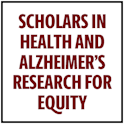
Call for pilot grant proposals now open
Early-career faculty members can now apply for pilot funds to advance ADRD research in community engagement, health communication, and implemtation science. Letter of Intent deadline is August 1, 2025.
Alzheimer’s disease and related dementias (ADRD) have risen to the forefront of the United States public health agenda. Growing research demonstrates the strong association between social factors and physical and cognitive health outcomes. Between 30% and 55% of health outcomes are ascribed to non-medical drivers of health (NMDoH). Partnerships with communities are critically and immediately needed to understand how to address the impact of NMDoH on ADRD outcomes among communities in the Southeast in order to improve ADRD-related outcomes. Expansion of the ADRD workforce can also strongly encourage participation of community members in aging and ADRD research and improve efficacy of programs and services.
Guided by National Institute on Aging (NIA) priorities, the SHARE team will:

Early-career faculty members can now apply for pilot funds to advance ADRD research in community engagement, health communication, and implemtation science. Letter of Intent deadline is August 1, 2025.

The National Institutes of Health has selected one of the university's foremost aging and health communication researchers, Daniela Friedman, as the recipient of a National Institute on Aging K07 Academic Leadership Career Award.
This Academic Leadership Career Award is funded by the National Institutes of Health, National Institute on Aging (K07AG088128).